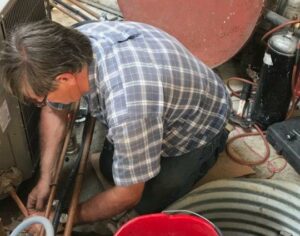 The sound of a kettle – the familiar pops and rumbles that it makes as it heats up – can be incredibly comforting. After all, they usually mean you’re about to drink something lovely – hot cocoa, coffee, tea, or some other drink to keep you toasty on a cold, Winnipeg, winter day.
The sound of a kettle – the familiar pops and rumbles that it makes as it heats up – can be incredibly comforting. After all, they usually mean you’re about to drink something lovely – hot cocoa, coffee, tea, or some other drink to keep you toasty on a cold, Winnipeg, winter day.
Those same sounds coming from your boiler, on the other hand? Not too comforting at all. They might even cause you a great deal of distress – your boiler isn’t, after all, supposed to sound like a kettle.
What you’re experiencing is what’s known as kettling – yes, that’s the actual, professional term for when your boiler sounds like a kettle. While it’s not necessarily dangerous, it’s certainly not good for your boiler. Let’s take a look at why:
Why kettles make that sound
To understand why boilers kettle, let’s first take a look at why kettles kettle!
Why? Because they kettle for the same reasons!
Water in your kettle starts heating at the bottom – that’s where your element is, after all. That water quickly begins to boil, but when the steam bubbles begin to rise to the top, they encounter colder water and lose their heat – this causes them to pop. The kettle will continue to rumble because of these pops until all of the water is sufficiently heated, at which point the steam can rise up out of your kettle, causing it to whistle.
That’s why kettles are so noisy!
Boilers don’t boil
So why don’t boilers make that sound all the time?
Because the name “boiler” is a misnomer. Boilers aren’t actually supposed to boil water at all – they’re just supposed to get it really hot (usually somewhere in the range of 21 degrees celsius).
If you’re hearing kettling sounds in your boiler, it means it’s boiling water when it’s not supposed to be. That means the water is getting overheated for some reason – and there are a couple of likely culprits.
It’s getting hot in here
Let’s take a look at two reasons why the water in your boiler might be overheating:
Limescale buildup
Limescale buildup is the most common cause of kettling. Water is full of minerals – the measure of how many minerals are dissolved in water is hardness. Winnipeg’s water is semi-hard, while surrounding areas can have harder or softer water.
These dissolved minerals can begin to settle at the bottom of your boiler, restricting the flow of water. This restricted flow can lead to water to become trapped over the heat exchanger, causing it to overheat and turn the water into steam.
There are a few solutions to the problem, from getting the heat exchanger cleaned of limescale to using a liquid inhibitor to prevent the limescale from developing in the first place.
A faulty thermostat
This one is pretty self-explanatory; a faulty thermostat can lead to water being heated too much, which can cause it to boil. When this happens, you’ll need to repair the thermostat (or related parts) or replace your boiler.
The problem with kettling
The annoying noises are problematic enough for some, but there are a couple of other very good reasons to solve the problems causing kettling.
When your system is kettling, it’s less energy-efficient. The cause of the kettling is probably leading to more wear and tear in your boiler than necessary, too, which can reduce its lifespan.
Fortunately, kettling is rarely dangerous. Back in the day, it was more dangerous because boilers didn’t have the sophisticated safety controls they do nowadays. If you have an older boiler, on the other hand, it’s best to address kettling right away, just in case.
Looking for boiler maintenance in Winnipeg? Get in touch with us. Regular boiler maintenance can help prevent kettling and improve your boiler’s lifespan!
